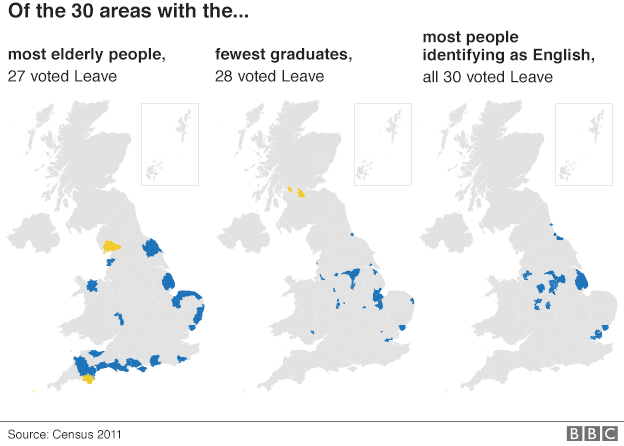Brexit: How much of a generation gap is there?
- Published

Many young Remain supporters have been blaming older voters for Brexit. But was there really a generational divide?
Remain supporter Elizabeth Mayfield, 19, looked on in despair as the referendum results came in.
And she knew who she blamed - an older generation that she sees as having secure jobs and gold-plated generous pensions, people who had caused house prices to soar and plunged the country into debt.
"I'm annoyed that baby boomers have messed things up for us again," says Mayfield, a student at Staffordshire University.

"They've voted for something that's not going to really affect them. They're not going to have to deal with the consequences."
It has been a common refrain on social media. Brexit would ruin "a whole generation's future despite them voting against", said one, external Tweeter. Another added, external: "Thank you baby boomers for the last nail in my generation's coffin."
A screen grab of a comment on the Financial Times website was widely shared. Young people's freedom of movement, it said, external, had been snatched away from "a generation that was already drowning in the debts of our predecessors".

Find out more

These resentments are familiar to most people who've attended a multi-generational family meal in the past decade. But there is evidence to suggest younger voters were vastly more likely to support Remain than their parents and grandparents.
The polling industry's methods may have been widely called into question since the 2015 general election. But successive polls consistently found there was a relationship between age and likelihood to support leaving the EU.
A survey by Lord Ashcroft, external of 12,369 referendum voters after they had cast their ballot suggested that the older they were, the more likely they were to have voted Leave.

Almost three quarters (73%) of 18 to 24-year-olds said they had voted to stay in the EU, compared with 62% of 25 to 34s and 52% of 35 to 44s. Support for Brexit formed a majority among every other age category and grew with each, peaking at 60% among those aged 65 and over.
Similarly, comparing data from the 2011 Census with the referendum results indicate a pattern, says Rob Ford, professor of political science at the University of Manchester.
It's "pretty evident" that "places with lots of older voters voted for Brexit while places with more younger voters voted Remain", he says.

For this reason there was anger, external about the fact that 16 and 17 year olds were denied a vote in the referendum, whereas Scots of the same age were able to participate in 2014's vote on independence.
But there's a danger in generalising.
Other demographic factors have been at play, too. There was evidence to suggest, external that class, level of education and previous history of having voted UKIP were important, too. Areas with higher rates of immigration were more likely to support Remain.
And though most 18 to 25 year olds backed Remain, many didn't.

James Hofstetter
James Hofstetter, 20, an engineering student at the University of Central Lancashire, voted Leave, and says it's wrong to imply the opinions of older people should count for less.
"Everybody's got one vote, and everybody's vote is equal," says Hofstetter.
"These older people have grown up with the EU. They obviously know what's going on." Many 2016 Leavers would have voted to stay in the Common Market in 1975, but grown disillusioned with the reality of European integration, he says, and their experience should be acknowledged.
And it's not as though the young couldn't have done more to make their voice heard.

There's evidence that areas with lots of younger voters tended to have lower turnouts, says Ford. This was also true in the 2015 general election, when young voters were disproportionately likely to have supported Labour, while older people were more likely to have gone for the Conservatives.
The young might resent the old for dominating politics. The old might retort that the young need to show up in greater numbers if they want their views to be heard. The divide between the generations looks set to continue.